#transmeds gain scientific literacy challenge
Explore tagged Tumblr posts
Text
in case anyone forgot where i stand
he/him lesbians are valid and hurt nobody
neopronouns are valid and hurt nobody
biological/medical research has not advanced far enough to prove anything wrt "brain sex"
i am not a transtrender/tucute, i am an anti-transmed nb lesbian
men should not and cannot tell lesbians how to be lesbians
cis people should not and cannot tell trans people how to be trans
if you compare me to an anti-vaxxer/flat-earther/science denier you WILL be catching these biologist hands
#anti-transmed#trans discourse#lesbian discourse#transmeds#transtrenders#tucutes#tucute bullshit#transtrender bullshit#transmeds gain scientific literacy challenge#transmeds come @ me#but cis transmeds don't u fuckin dare interact
425 notes
·
View notes
Photo
christ ok. couple things.

it's a joke, and i have it in my bio bc i've been studying genetics for approx 5 years now so i personally find it incredibly funny. i've been fighting against people that use scientific research to try and prove that gmos are dangerous so i mean. this is nothing new to me.
also the mic article actually?? does??? summarize the scientific article i linked????? i got it straight from the mic article????? so idk how u got there.
it does not HAVE to be a scientific review to be well written and accurate btw. i'd consider the mic article a good 3rd person source bc 1) it gives links to its sources, 2) it talks about the article in depth without getting boring or confusing, and 3) the author has written abt other science research?? granted it's some pretty weird shit, but it's not as if he just decided to summarize a scientific article on a whim. it looks like it's his Literal Job to fuckin. write about science
obviously u would want to use the actual peer reviewed article in question for any academic writing. but for someone who's just curious abt the subject? this is a Good Source imo
in terms of actual subject matter, i did go through some of the responses u got so i'll just respond back here ig
my internet is real slow sometimes so i will admit! i missed the replies to that article bc i just started scrolling past the abstract as soon as i could
i went back n clicked on some of them and u know what? they could be right. i don't study neurology, so i don't actually know what methods work best or the standard for data analysis. i do my best to understand the results, and thoroughly read the discussion and/or conclusion to help. so if joel et al produced a shitty study! that's on me for not realizing
on the other hand though, it's incredibly common to have contradictions in any kind of research. science is NOT free from politics and bias, as ideal as that is. i think that's important to keep in mind when u see responses to articles, and keep an open mind to both sides
which brings me to my next point. i don't actually have a problem w the idea of brain sex! i think this research is really important, especially in the context of mental/chronic illness
my problem is when people try to take peer reviewed articles abt brain sex and present them as """fact""" bc 99.9% of the time i read them, the ultimate conclusion is that there is none. no scientists can come to a conclusion on any of this research yet!
it's irritating to me, to say the least, that y'all seem to have your mind set on the existence of brain sex.
i don't want to ramble abt this for ever, so i'll just leave it at that
and to directly address @keyhollow
1) pls send me ur research i love to read different stuff abt biological sciences whether it relates to my field or not
2) ur making some real leaps there. who's to say that it's not controlled by genetics? or hormones? or the environment? we don't actually know so please,, don't say it's "proven itself time and time again" when i can't find a single source that comes to a solid yes or no conclusion.
and finally, i don't have """nothing"""
while i realize this is just one source, it's one i really like bc it's fairly recent (2017) and the final paragraph puts my stance into words pretty damn well:

any other sources i might use are ones that transmeds themselves have given me bc again...none of the peer reviewed articles i've read come to any sort of conclusion, and some actually contradict the idea of trans identities being caused by brain sex, or just the idea of brain sex itself. so don't come at me without peer reviewed articles that you've actually read (more than just the abstract) and actually prove your argument, thanks
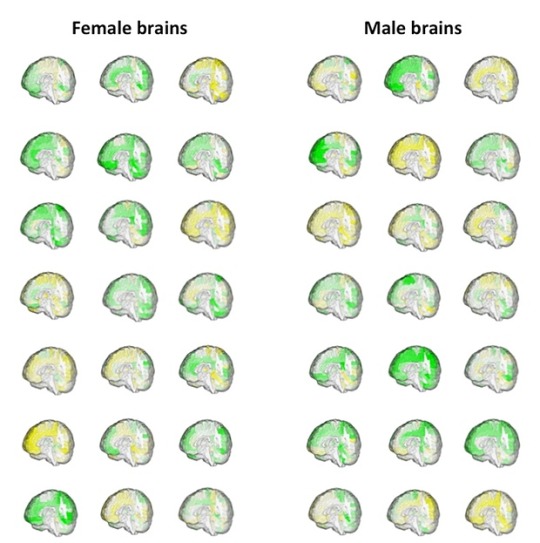
Male and female brains aren’t wired differently
New research, published in October in the Proceedings of the National Academy of Sciences, concluded that despite size discrepancy, there’s no functional difference between men’s and women’s brains. “Male” brains and “female” brains simply don’t exist. In fact, there’s significant overlap.
#love how my initial argument of 'don't discredit this source it's actually a good one'#turned into fuckin. this#am going to bed now so this will be the last i talk abt this#anti-transmed#transmeds gain scientific literacy challenge
128K notes
·
View notes
Text
ok @the-defiant-pupil i'm just gonna go ahead and make a new post bc this is about to get too long for my adhd ass
(context: continuation of this post)
1. funny thing is, i've actually read most of your sources already. they get really, really boring after awhile though, bc all of them start to say the same thing: yes there are differences, but there are also similarities, and scientists have yet to figure out the significance of this.
i'm not gonna go through each and every one of your sources, and i shouldn't be expected to either. when it comes to biological research, find the most recent articles with the most solid evidence/conclusions and call it good. don't dredge up an entire archive. i could find you sources that only characterize lichens as 2 symbiotic organisms rather than 3, but that wouldn't be correct bc the most recent research says otherwise. so yeah, just bc you CAN find that much info out there doesn't mean all of it is viable and should be used.
also, you can't just list a bunch of sources and expect it to be enough. you should contextualize them, explain them, tell your audience why each one matters. if you're really going to have that many, then be prepared to give a short annotation for each one bc i can guarantee you no one has enough time on their hands (or in my case, attention span) to read that many sources
your "plain as day" source by the way?? says this as well:
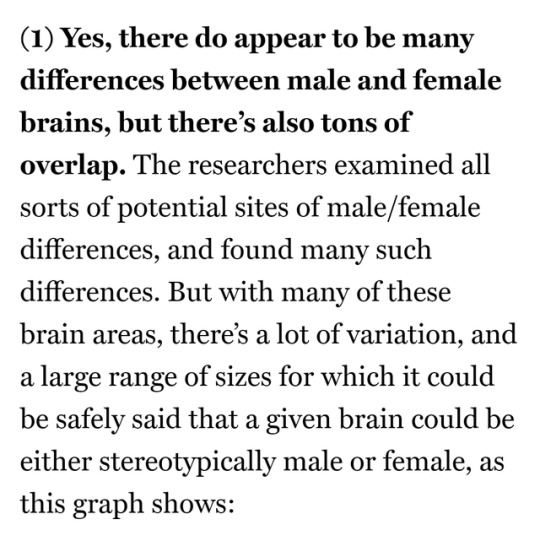
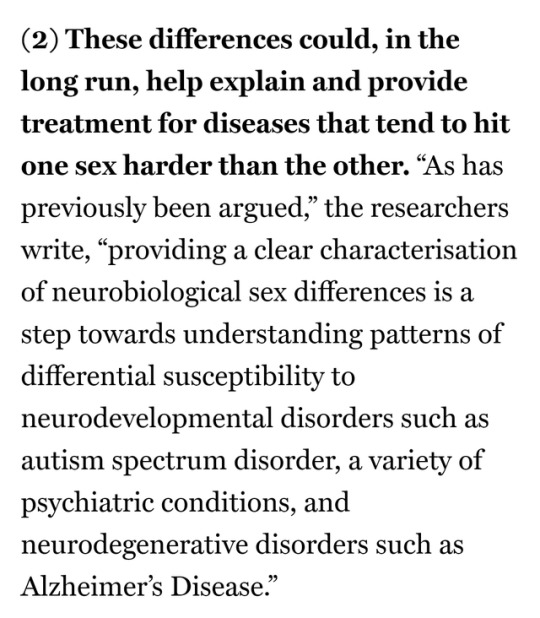
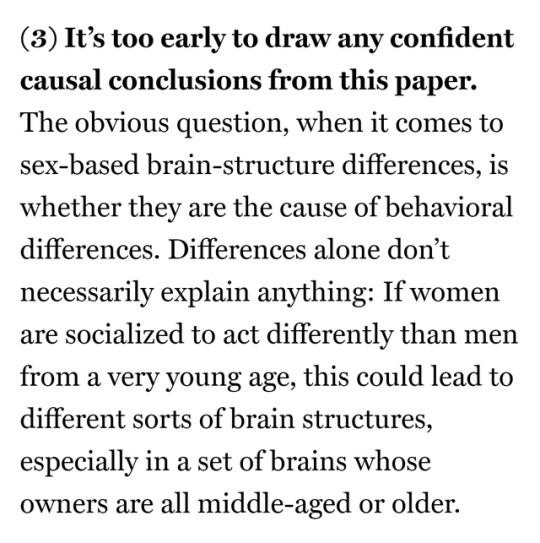
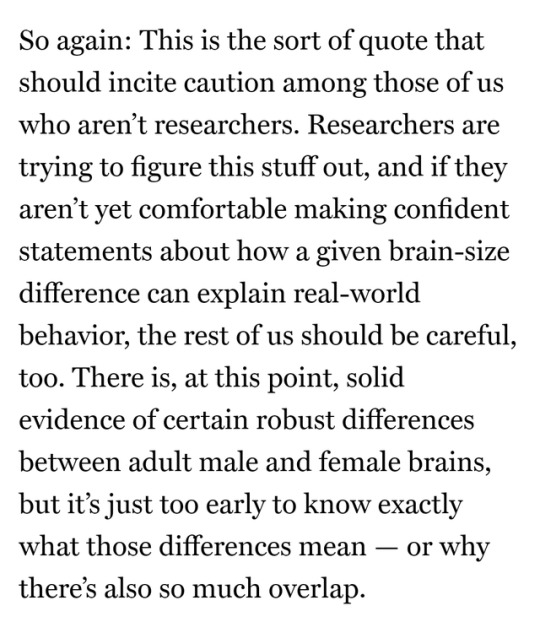
this is what i was talking about earlier!! do you actually read, contextualize, and analyze what you read? or do you just find the first line you agree with and run with it?
bc what i got from reading that article is that even after years of research and the largest study to date, scientists STILL don't fully understand what they're looking at, and they might never. so we, as people Not Actively Researching This Subject should be incredibly hesitant to draw our own conclusions when even the researchers can't do so.
i also like that the author mentions how socialization can affect brain structure and development — did you know that domestication causes visible differences in gene structure between the ancestor and current-day species? bc of selective breeding, humans changed the genetics of dogs, cows, crops, etc.; genetics changed bc of domestication, domestication didn't come about bc of a change in genetics. and i KNOW that you're going to tell me this has nothing to do w what we're talking about, but it does hold a similar concept: it's not just genetics and bodily functions that affect behavior, the environment has an equally important role.
similarly, gene expression in almost every species is highly regulated by the environment just as equally as it is the body (and for clarification: environment means anything external, body means anything internal). as are hormonal responses, reflexes, emotions, etc. all of which can have subtle but lasting impacts on the body! i don't actually think that anti-transmeds are trying to deny science when we say that how your brain developed is not the only thing that affects gender identity! i think it's kinda actually the opposite!
2. i've haven't heard of this tumblr biologist, so please direct me to their publications, i'd actually really love to read them
3. science literacy is a whole other beast than literacy in general. like, yes, you have to be able to read, but suddenly specific word choice and HOW you read articles becomes important. it goes from reading chronologically (english literacy) to reading section by section and contextualizing what you've read in previous sections and articles so that by the end you understand the initial hypothesis, if the evidence ACTUALLY proved it, if their methods were sound, and why it matters in the particular field.
i'm not trying to say that people who aren't studying science can't read peer-reviewed articles and understand them, but you do have to realize that it's a completely new skillset you have to practice over and over again, not just something you can pick up on the fly
4. i think you completely missed my point about the anti-vaxxer movement. the reason it started was bc McBastard Wakefield published his article and before any other research could be done to refute it or back it up, the greater population picked it up and ran with it. 7 or so years since it's been debunked and he lost his medical license, but people still believe him bc he got published, and to some of the most accredited journals at that.
my point was that just bc the research exists doesn't mean we should accept it at face value until the medical/scientific community can undeniably say "this is what this is, and what it means." and they're STILL doing further research, which means that hasn't happened yet. bc the whole point of science, and by extension research, is to never be satisfied w your results, and instead continue to look for more than you can currently see. or at least that's what i've been taught.
bc to look at published articles and assume that they MUST be true bc it's PUBLISHED SCIENCE is...exactly what the anti-vaxxer movement began on. and i'd rather not repeat that.
(please show me, by the way, how """tucutes""" 1. actually exist and 2. harm anyone by simply living their own damn lives)
5. yeah """""tucutes""""" don't have any science bc uh.....there really is none. science is a process, and we're currently in the research phase which means NO ONE should be using it as proof. it's good to say "hey this exists" but to completely invalidate someone's existence based on studies that scientists are still trying to understand? that's called abusing and misconstruing results
6. i'm guessing you don't actually care, but sure. i'll explain mating types of fungi to you.
in short: genetic diversity is advantageous for survival, and fungi are nothing if not crafty little bastards, thus 1000s of mating pairs for better chances of sexual compatibility
in long: each mating type is determined by a set of genes. really, you can think of mating types as extended alleles, since each distinct allele has a distinct mating type.
so as for 5 different mating types and how they're different...there you go. that'd be like asking me to tell you 5 different alleles of the same gene and how they're different. the only difference is in sequence and then how they're expressed due to differences in sequence.
usually we don't categorize every single mating type since that'd be a bit...much.
however, we can and do categorize fungi by how they reproduce! i.e., what kind of syntamy do they display? can they go through diploid selfing? can they inbreed or only out cross? what's their primary stage of life: diploid or haploid? do they rely on sexual reproduction or asexual reproduction? if it's an ascomycete, do they form pericarps or ascocarps?
in fact, one of the main differentiators between fungi is their life cycle, most of which is geared towards reproduction. that's why although basidiomycetes and ascomycetes are the only fungi that can form macro fruiting bodies (as well as many, many other similarities), they'll always be categorized differently.
but i digress. the reason i compared fungal mating types to brain morphology and "sex" categorization is bc i was making an analogy. i'm not a neurologist, as you can probably tell at this point, but that doesn't mean i haven't taken any classes that covered the brain pretty extensively.
what i was really trying to say was this: everything that i've read so far says that although there's definitely some differences between brains, there's also a significant amount of overlap, so much so that when you try to categorize the brain into two distinct types, you're still going to have an incredible amount of variety.
likewise, you could, theoretically, do the same to fungi. you could sequence the genes from each mating type, determine the different SNPs, and categorize them into two distinct groups based on what SNPs they do/don't have. it wouldn't make sense to do so, though, bc there'd still be too much variety within each group.
this was just me trying to relate it to what i personally study but tbh i can see how that would've been confusing, so i apologize for that
2 notes
·
View notes
Text
transmeds gain scientific literacy challenge
#transmeds#tucute bullshit#transtrender bullshit#transmeds gain scientific literacy challenge#i cannot tell you. how tired i am.#you cannot throw sources like spaghetti at the wall and expect all of them to stick.#read them. internalize them. analyze them. compare them.#go play video games for an hour and then reread them.#print them out so you can write on them (or something similar).#p a y a t t e n t i o n#do you not understand that almost every single source you try to use as a 'gotcha'#actually contradicts you?#or are you intentionally trying to manipulate the info?#i'm genuinely worried for some of you.
1 note
·
View note